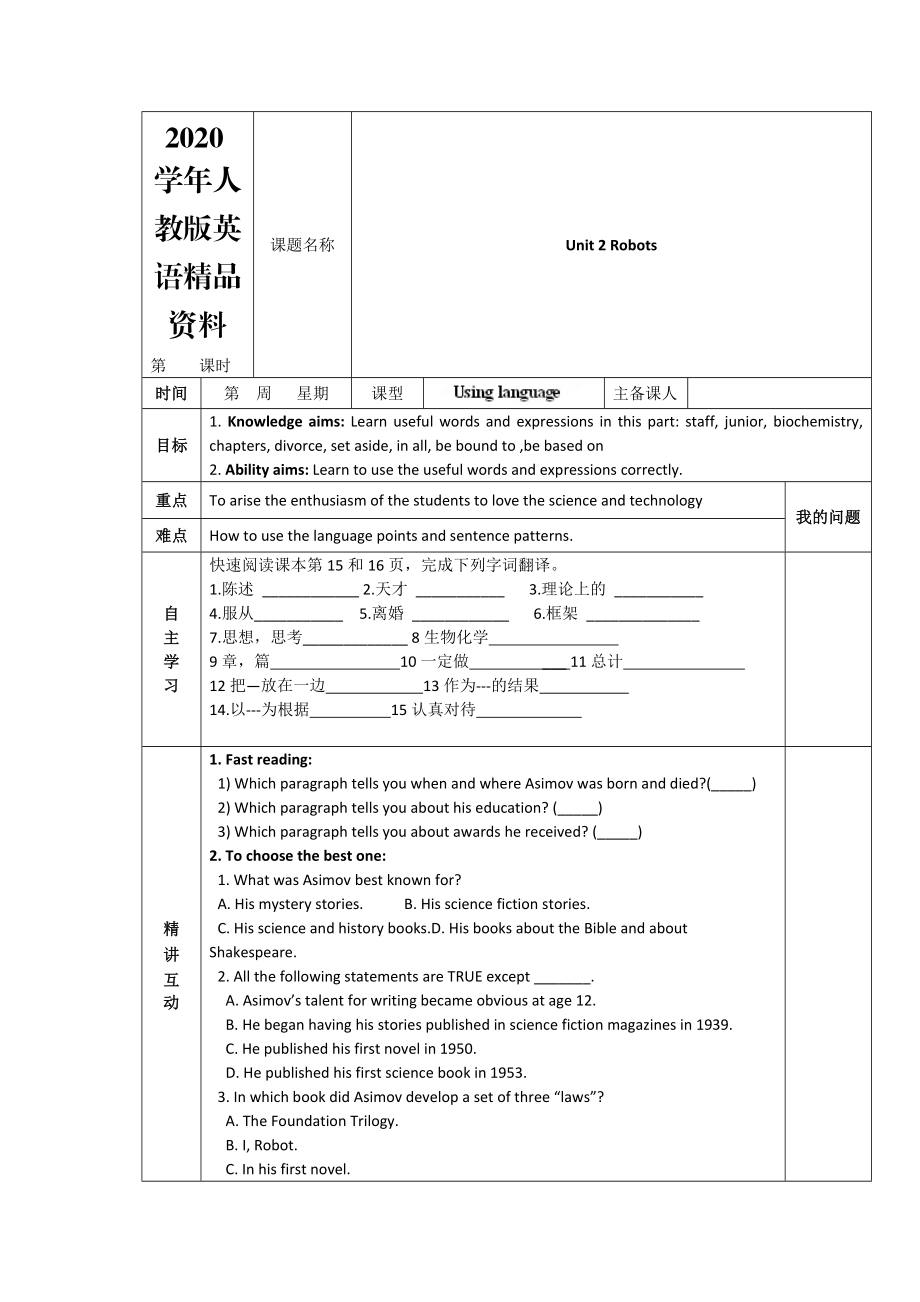《2020人教版選修7導(dǎo)學(xué)案:unit 2 robots using language學(xué)生版》由會員分享����,可在線閱讀��,更多相關(guān)《2020人教版選修7導(dǎo)學(xué)案:unit 2 robots using language學(xué)生版(4頁珍藏版)》請在裝配圖網(wǎng)上搜索���。
1�����、2020學(xué)年人教版英語精品資料
第 課時
課題名稱
Unit 2 Robots
時間
第 周 星期
課型
主備課人
目標(biāo)
1. Knowledge aims: Learn useful words and expressions in this part: staff, junior, biochemistry, chapters, divorce, set aside, in all, be bound to ,be based on
2. Ability aims: Learn to use the useful words and express
2�、ions correctly.
重點
To arise the enthusiasm of the students to love the science and technology
我的問題
難點
How to use the language points and sentence patterns.
自
主
學(xué)
習(xí)
快速閱讀課本第15和16頁,完成下列字詞翻譯����。
1.陳述 ____________ 2.天才 ___________ 3.理論上的 ___________
4.服從___________ 5.離婚 ____________ 6.框架 __
3、____________
7.思想��,思考_____________ 8生物化學(xué)
9章��,篇 10一定做 ___ 11總計
12把—放在一邊 13作為---的結(jié)果
14.以---為根據(jù) 15認(rèn)真對待
精
講
互
動
1. Fast reading:
1) Which paragraph tells you when and where Asimov was bor
4�����、n and died?(_____)
2) Which paragraph tells you about his education? (_____)
3) Which paragraph tells you about awards he received? (_____)
2. To choose the best one:
1. What was Asimov best known for?
A. His mystery stories. B. His science fiction stories.
C. His science and history
5�、books.D. His books about the Bible and about Shakespeare.
2. All the following statements are TRUE except _______.
A. Asimov’s talent for writing became obvious at age 12.
B. He began having his stories published in science fiction magazines in 1939.
C. He published his first novel in 1950.
6、
D. He published his first science book in 1953.
3. In which book did Asimov develop a set of three “l(fā)aws”?
A. The Foundation Trilogy.
B. I, Robot.
C. In his first novel.
D. In his first science book.
4. What might happen in a world where there were robots if Asimov’s three laws didn’t e
7����、xist?
A. Maybe robots will harm or injure human beings.
B. Maybe robots will disobey human beings.
C. In order to protect their own existence, robots may injure human beings.
D. All of the above.
languages points:
1.be bound to
【原句再現(xiàn)】Who said that making a robot so much like a human
8�、was bound to cause trouble?
be bound to詞義_______________
翻譯:別騙她,她肯定會發(fā)現(xiàn)的���。_________________________________________________
2.take...seriously
【原句再現(xiàn)】---he started to take himself seriously as a writer. take...seriously詞義___________
練習(xí)1.完成句子___________________________________________; she is
9����、just flying her kite.別過分認(rèn)真地對待她的建議;她不過是在試探一下反應(yīng)而已�����。
練習(xí)2.Dont take his promise very________����; he never keeps his word.
A.seriously B.extremely C.entirely D.strictly
達
標(biāo)
訓(xùn)
練
短文改錯:文中共有10處錯誤,每句最多有兩處���。錯誤涉及一個單詞的增加���、刪減或修改。
Mr Harris, I still remember the first date when you began to te
10��、ach us three years before. We were quite shy and poor at listening and speaking. You patiently encouraged us to practise as much as possibly. Your class was so lively that all of us were interested. Under your help I improved my English step after step, and in NMET I got a satisfy result. Mr Harris, thank yo u very much indeed.
How do I miss you!
I hope to hear from you soon.
作業(yè)
小結(jié)
錯誤類型歸類:
1. ________________________2._________________________3._______________________
4. ________________________5.__________________________
�
 2020人教版選修7導(dǎo)學(xué)案:unit 2 robots using language學(xué)生版
2020人教版選修7導(dǎo)學(xué)案:unit 2 robots using language學(xué)生版

